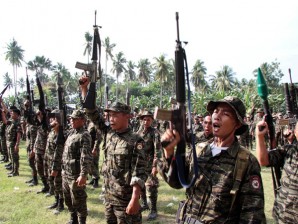Gov’t-MILF peace talks to resume in July
MANILA, Philippines – The next round of formal exploratory talks between the Government of the Philippines peace panel and the Moro Islamic Liberation Front will resume in July.
“The panel chairs have already agreed on a date early next month to further discuss the annexes on wealth sharing, power sharing and normalization,” said GPH chairperson Miriam Coronel- Ferrer in a statement released by the Office of the Presidential Adviser on the Peace Process on Friday.
She also met informally with MILF chief negotiator Mohagher Iqbal in Oslo, Norway.
Coronel-Ferrer, together with Presidential Adviser on the Peace Process Teresita Quintos Deles, attended the Oslo Forum 2013 which was organized by the Norwegian Ministry of Foreign Affairs and the Centre for Humanitarian Dialogue last June 18 and 19.
Also in the event were Iqbal, Malaysian Third-Party Facilitator Tengku Datu Abdul Ghafar Tengku bin Mohamed, MILF peace panel member Maulana Alonto and MILF consultant Raissa Jajurie.
Article continues after this advertisementThe forum served as a venue for senior third-party conflict mediators and other key peace process actors to share experiences, identify challenges, and reflect on their own and others’ peace process practices.
Article continues after this advertisementCoronel-Ferrer said she also handed over to her counterpart the government’s full proposals on the wealth sharing annex for the MILF to study and consider.
Both panels are completing the remaining annexes on wealth sharing, power sharing, and normalization that, together with the Framework Agreement on the Bangsamoro, will comprise the GPH-MILF comprehensive agreement. The annex on Transitional Arrangements and Modalities (TAM) was signed by the parties in February.
Only recently, the MILF expressed “frustration” over the delay in talks. It also said the government was trying to introduce wealth- and power-sharing provisions.
Quoting a radio interview, the OPAPP statement said that GPH panel member Senen Bacani expressed optimism that a comprehensive agreement would be signed in a month or two, saying that there are only a few remaining issues on the annexes but added that these were the most difficult issues, hence the need for due diligence “so that when the comprehensive agreement will finally be signed, it will pass legal and constitutional scrutiny.”
Bacani added that they wanted to make sure that the comprehensive agreement would not follow the fate of the Memorandum of Agreement on Ancestral Domain which was declared unconstitutional in 2008.
